Norwich Road, Old Norwich Road
The Emperor: a unique survivor in Ipswich!
293 Norwich Road
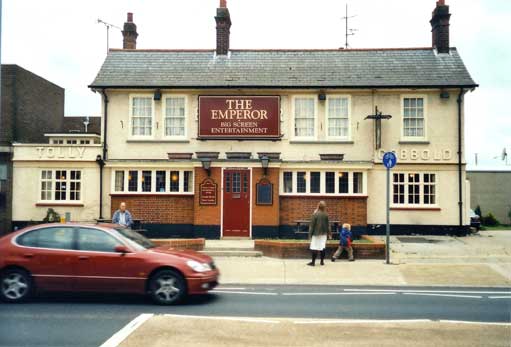
A mile or so up Norwich Road from the Rose and Crown
Brewery, we find
the
vestige of another era of brewing in the town: 'Tolly Cobbold', one
word
on each side of The Emperor' public house.
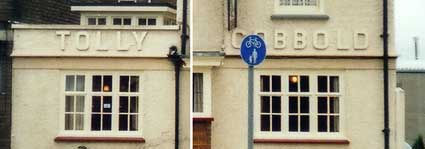
The pub sign depicts
Napoleon,
once the most feared and hated enemy of the British, who gives his
self-proclaimed title
to the hostelry; it is a name in use for some time, too as you can see
the
original
embossed letter 'E' to the left of the central modern maroon/brown
sign, and the side of the last 'R' to the right (see previous names
below).
Judging by the spacing, at first we thought that there might be 'Tolly
Cobbold' or 'Ales &
Stout'
lettering below the name [see
UPDATE April 2010 below]. It's likely that a pub called 'The Napoleon'
would have beeen far less popular with patrons. The use of theatres of
war and names of warriors in road and pub names is not unknown: down
Norwich Road towards the town is the Inkerman public house. Inkerman,
fought on 5th November 1854, was the principal land battle of the
Crimean War of 1854-56. This war was fought against Russia by an
alliance consisting of Britain, France and Turkey and its object was to
prevent Russia from seizing Turkey.

[UPDATE April 2010: For a brief
day or two, during repainting, the Emperor was devoid of its sign board
and the original lettering revealed:
'THE
EMPEROR
INN'
The lettering is once again covered now.]
This public house has been part of Ipswich history since 1843,
earlier called
variously The Maypole and The Rose & Crown. We know of no other
public house in Ipswich which retains on its frontage its name in
integral relief capitals along with the name of the one time
brewer-owners: 'Tolly Cobbold' (who merged in 1957), let alone one that
in 2012 was still
(just about) trading as a pub. Similar 'Tolly
Cobbold'
lettering can be found at Felixstowe Ferry
and Needham
Market.
[UPDATE 8.12.2012: "Hello
Borin, I am writing on behalf of Friends of the Emperor to let you know
that unfortunately it seems almost sealed that the Emperor is going to
converted into a Tesco Extra! We have been campaigning to save it as a
community pub, but Punch Taverns have confirmed they're only talking to
an agent acting on behalf of a supermarket. We are expecting it to
close in February or March, though of course it may be sooner.
Thankyou for helping to preserve a little bit of local history, Rebecca
Moss" Very sorry to hear it. See also The
Golden Key, in a similar plight.]
[UPDATE 8.10.2013: the sad
state of this Edwardian public house (below) with its lettering just
about intact. Thankyou Tesco, g'night!]
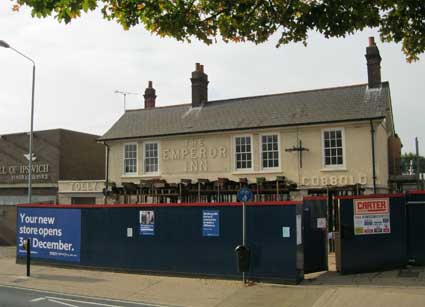 2013
images
2013
images
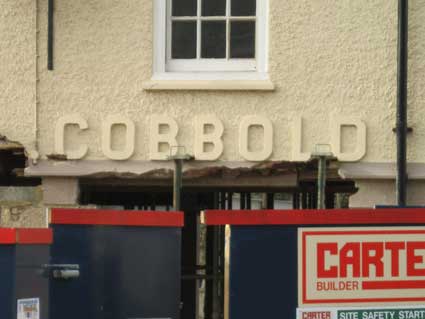
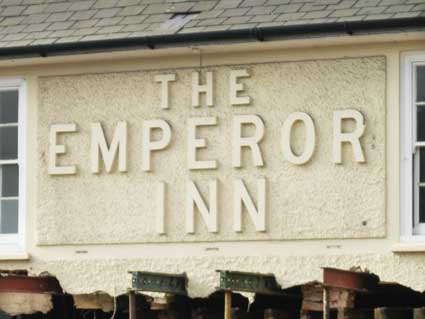
See also the Pubs
& Off-licences page and the Tolly Cobbold House & Brewery
pages.
[UPDATE 20.12.2013: Well, we
think that we might have secured a small victory here, given the damage
seemingly about to be wreaked on the lettering as shown above. The
original architect drawings for the change to a shop showed this
Edwardian public house with the street elevation radically changed, all
lettering lost. However, the details below show that not only 'TOLLY'
and 'COBBOLD' survive (yay!) but that the Tesco Express sign appears to
have been
fitted over 'THE EMPEROR INN' lettering in the centre. We do hope so.]
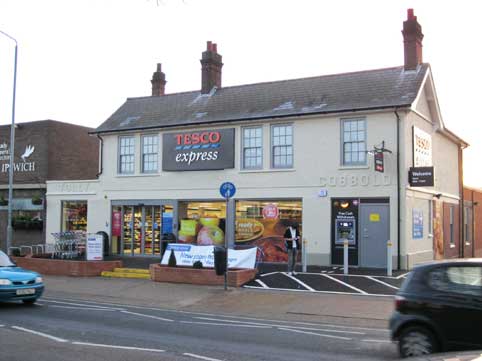
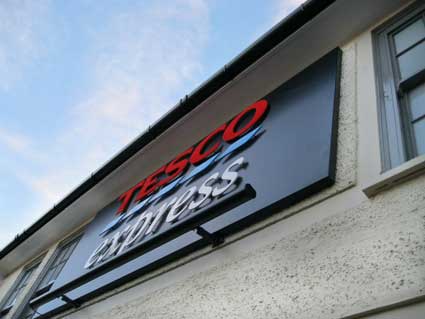
It would have been so easy for the once all-powerful grocer to wreck
the frontage of The Emperor, so we must take some comfort from that.
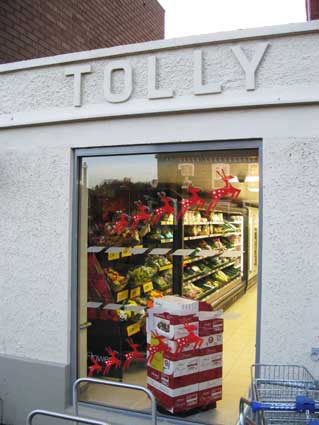
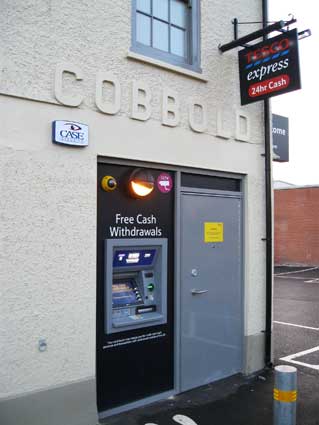 December 2013 images
December 2013 images
The Ferodo sign on Norwich Road
railway
bridge.
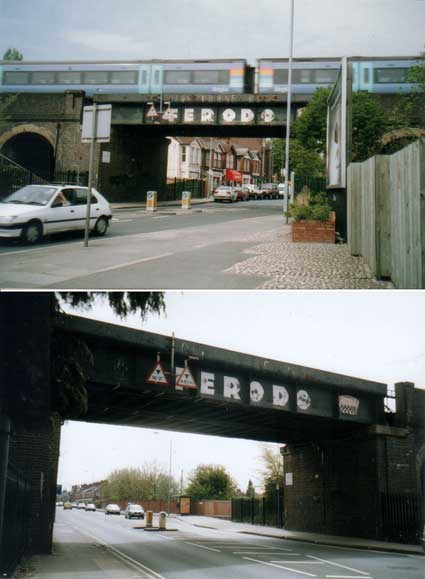
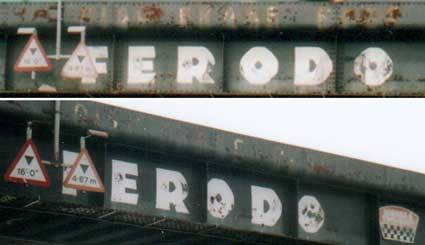
Recognised for decades by travellers up and down
Norwich Road is the
painted lettering in huge trademark font on the railway bridge:
'FERODO'
the motor tyre manufacturer who also made the products
proclaimed on the bridge's parapet in smaller lettering:
'DISC BRAKE
PADS'
which is readable more from the Ipswich side of the
bridge (upper pictures) and almost weathered away on the Norwich side
(lower pictures). The smaller signs on each side which show a
chequerboard below and curved top display: 'Formula Two-Four'.
Symptomatic of our strange culture of over-signing
the public highways is the difficulty in photographing the whole of
'Ferodo' from the right angle to see all (most) of it, the main
obscuring clutter being the triangular height restriction signs. All we
had to do was wait until a train passed over the bridge for that
multi-infrastructural effect ... talking of
which:-
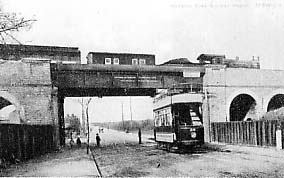
This postcard predates the Ferodo advertising (around
the turn of the
century) and shows a very different (almost) centralised lettering of
an official tone:
'Passengers are requested to keep their seats while the car is
passing
under the bridge.'
The people of Ipswich had never ridden so high above
the roads before and, given that the pale rectangular sign giving the
destination and route number at the front of the tram seems higher than
a man's head, perhaps they were being rather over-cautious. The absence
of any housing to the right of the road on the Norwich side of the
bridge illustrates the early date; this area is now occupied by the
Crofts and the right turn into Ashcroft Road is at the point occupied
by the cart stands in the middle of the road, just visible in the
picture). The tram company stopped their vehicle in an appropriate spot
for this promotional picture, the camera operator set up his tripod,
wet plate camera and cloth and
awaited a train crossing the bridge for the full effect.
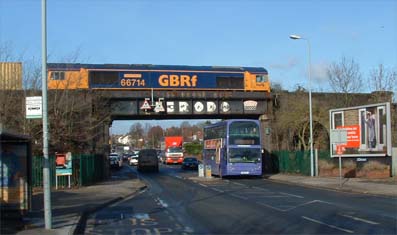 Photograph courtesy Dave Riseborough
Photograph courtesy Dave Riseborough
Above: in digital camera fettle, the Norwich Road bridge by Dave
Riseborough, reproducing (by happy chance) in January 2010 the same
configuration of train and bus as the c.1900 photograph above it. Hats
off to him.
Incidentally, David Kindred's Flickr collection of vintage images (see Links) shows this bridge in a different guise.
The caption reads:
'Maintenance staff inspecting damage to the rail bridge on Norwich
Road, Ipswich in the 1950s. The bridge had been hit by steel loaded on
a lorry.'
painted boldly on the parapet is: ''The SAFEST BRAKES in the WORLD'
and underneath on the main body of the bridge: 'HYDRAULIC LOCKHEED BRAKES'
the 'Lockheed' in branded logo - white caps with drop shadow. (On a
British Railways poster under the bridge an advertisement for rail
travel to 'London: 9/6' (nine shillings and sixpence; nearly ten bob
was a lot of money in those days!).
See more about the Ferodo brand and several other Ferodo bridges around
the country on Ed
Broom's site on the Links page.
More can be found about railway
bridges, railway pubs and club in Croft Street
and the railway as it skirts Bourne Park.
Vestige of Whitton Crown
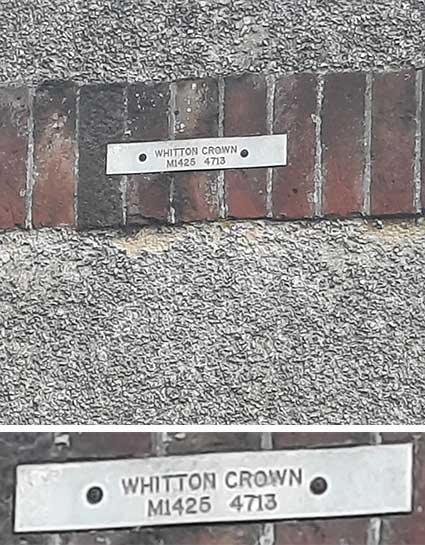 2023 image
courtesy Dominic Zagni
2023 image
courtesy Dominic Zagni
'I have attached a photo of the substation on Old Norwich Road. It's a
plaque on the wall that caught my eye mentioning the long gone Whitton
Crown which was across the road. Dominic Zagni.' Many thanks to the eagle-eyed Dominic
recalling a public house of which many will not have heard. Dominic is
descended from the Zagni family, famous in Ipswich for founding Peter's Ice Cream.. See that page for more
information and a family portrait]
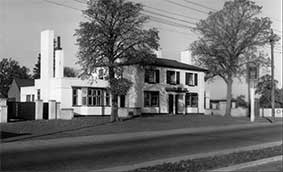 Image from the book Ipswich lost
inns,
taverns and public houses by David
Kindred see Reading
list
Image from the book Ipswich lost
inns,
taverns and public houses by David
Kindred see Reading
list
Above: the Whitton Crown public house around the time of closure
in 1992. It stood on the west side of the 'original' Norwich Road which
ran past The Maypole public house and between fields to Claydon
village. The building/expansion of the A14 (formerly the A45) resulted
in a new linking road past the football pitches to join the A14 near to
the Asda supermarket. On the site of the pub a car dealership was built
– opposite where Old Norwich Road joins Norwich Road. The Suffolk CAMRA
site has a date of 1817, but the pub may be even earlier.
Old Norwich Road
This road name was invented in the early 1990s when the large 'Ipswich
By-pass' was built. The part of Norwich Road which had run between
Meredith Road and Claydon village was largely left as a side road with
a
new link road to the newly-built A14. The current A14 includes parts of
the
former A45 between Felixstowe and Cambridge, the A604 between Cambridge
and Kettering, a short stretch of the former A6 west of Kettering, plus
a new link road which was constructed in the early 1990s between there
and the M1/M6 interchange at Catthorpe, Leicestershire. It is now a
major link for freight from the midlands to Felixstowe Port. The
section of the road between Claydon and Ipswich was renamed 'Old
Norwich Road' to reflect its lower status. Since that time the Claydon
end has become an access road to a few houses and a business park; the
only traffic allowed accesss to the whole length of Old Norwich Road are the buses.
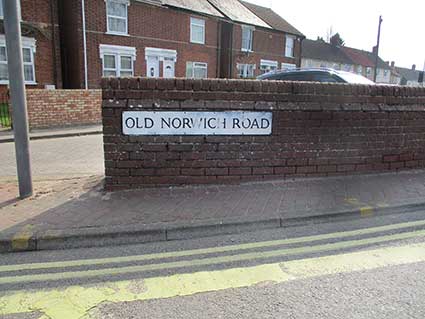 2022 image
2022 image
The house immediately to the left of the sign – effectively, the first
house in Old Norwich Road – is no. 640. There is a similar vintage
street nameplate over the road, mounted on posts. These thin, modern
nameplates are showing the distress and fading characteristic of the
vintage.
Home
Please email any comments and contributions by clicking here.
Search Ipswich
Historic Lettering
©2004 Copyright
throughout the Ipswich
Historic Lettering site: Borin Van Loon
No reproduction of text or images without express written permission





 2013
images
2013
images




 December 2013 images
December 2013 images


 Photograph courtesy Dave Riseborough
Photograph courtesy Dave Riseborough 2023 image
courtesy Dominic Zagni
2023 image
courtesy Dominic Zagni Image from the book Ipswich lost
inns,
taverns and public houses by David
Kindred see Reading
list
Image from the book Ipswich lost
inns,
taverns and public houses by David
Kindred see Reading
list 2022 image
2022 image